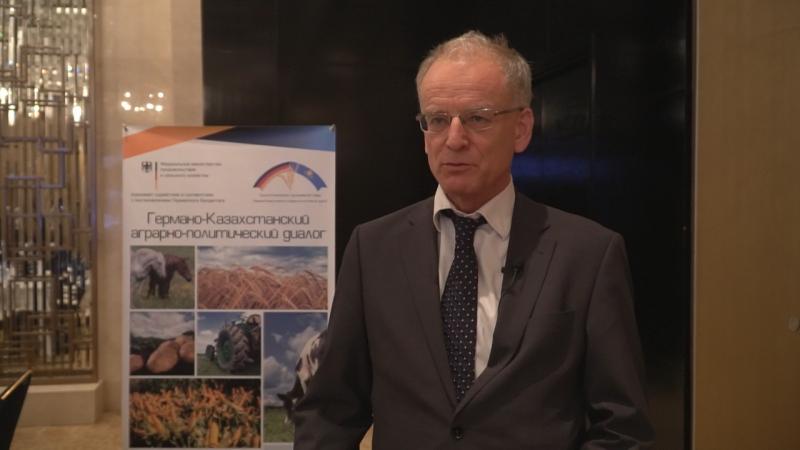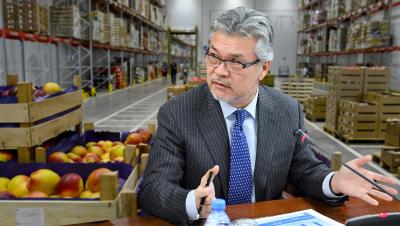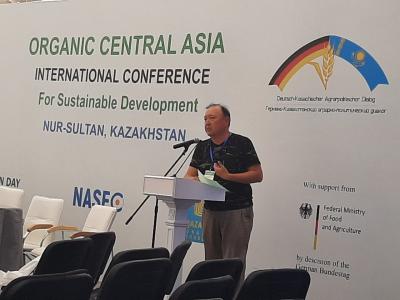
The head of the project "German-Kazakh Agrarian-Political Dialogue Alexander Barnevitz, during the round table on "Agrarian subsidies in the Republic of Kazakhstan", demonstrated how to evaluate the efficiency of the State Agrarian Programs, reports World of NAN.
Tokayev speaks about the state that listens, but it is of no use. Kazakhstan's Ministry of Agriculture is not trying to listen to farmers. And why is that? Maybe they are too quiet, or they just do not ask. Foreign experts had to act in their stead: "German-Kazakh Agrarian-Political Dialogue" together with NCE Atameken conducted the survey of Kazakh farmers. A total of 657 farmers were interviewed, 300 of whom only engage in livestock production, 143 in crop production, and 214 in mixed farming.
Farmers were asked topical questions. For example, they were asked if they made any investments in the industry. The results were disappointing, as only 46% of respondents had invested money in production in the past 12 months. Most of the investments went for the purchase of new machinery and equipment - 75.6%, for the purchase of cattle - 18.1%, for the construction of buildings - 4.6% and for the land - 1.6%. The German expert was greatly surprised that more than half of the farmers do not invest in the industry. The reasons, in his opinion, are different: someone cannot or does not want to. But we know the reasons: the field of agriculture in Kazakhstan is unstable: exports are limited, there is no stable state support, high risks, high-interest mortgage loans, and much more. In these conditions, only the brave are daring to be engaged in agriculture. Of course, the government introduces programs and injects money, but everybody knows how the system works.
German experts also asked the farmers about the sources of financing. According to the results of the survey, only 46.8% invest their own money into the business, the rest takes loans. Most of the loans - 35% are taken from the Financial Support Fund. According to Alexander Barnevitz, this may be due to the fact that the number of agrarians with greater access to the fund's programs prevailed among the respondents.
The survey also showed that subsidies in cattle breeding remain the most demanded - 20%. This may also be due to the fact that the majority of respondents are engaged in cattle breeding.
The second most important were subsidies of interest rates at 11.9% and investment subsidies at 11.9%. Fertilizer and herbicide subsidies earned the least importance points.
"I have come to the conclusion that this type of subsidy is not very important. Here it makes sense to focus on subsidizing remuneration rates, because farmers know better what to buy or not to buy," said the German expert.
How simple, right? If you ask farmers what they need most, they will tell you. Imagine that! It is a shame that our officials have not thought of conducting such a poll. The reason here, of course, is not folly, but perhaps the inefficient way the agency works. Our officials are primarily trying to satisfy the " higher-ups", to show that we work, and that the inefficiency is because of the farmers inability.
Farmers can do everything, but as the survey showed, it is the system that can't. When providing support measures farmers noted such problems as lengthy application processing time - 24%, lack of collateral for loans - 21%, the manifestation of bureaucracy in the consideration of applications - 12%.
"Here we can do a deeper analysis to find out the reasons. The problem of lack of collateral is mostly with pasture and hay owners, they have fewer buildings and equipment. That shows that the state should help there with its targeted programs. As for the lengthy terms - this is also a problem for all farmers. Such lengthy terms can be due to the lack of competition, because most of the loans or subsidies are issued through the Agrarian Credit Corporation, which works according to its own rules," said the expert from Germany.
Thus, the survey revealed that farmers need collateral-free soft loans at low interest rates or guarantee loans, the stability of state support measures, qualified personnel and the creation of the necessary infrastructure for agribusiness. And all this should be provided by the state.
"Interesting results can be achieved by this method of survey. If you go deeper with the questions, you can get an accurate assessment of the support of state measures. In Germany such surveys are constantly conducted, because detailed and reliable information is necessary for management of such sector", - summed up the head of the project "German-Kazakh Agrarian-Political Dialogue", Alexander Barnevitz.












































Обсуждение